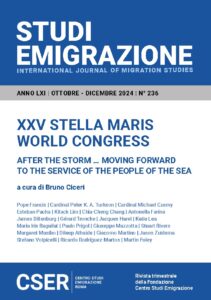Studi Emigrazione n° 236/2024
Studi Emigrazione Anno LXI: 236/2024
It is a great pleasure to write the introduction to the proceedings of the XXV° Stella Maris World Congress held in Glasgow from the 2nd to 5th October 2022. The Congress, delayed by 2 years due to Covid-19, was due to mark the occasion of our Centenary, as our mission was founded as the Apostleship of the Sea in Glasgow in October 1920, to support seafarers in need while in port. It has been an incredible journey, and since then, the Apostleship of the Sea, today known as Stella Maris, has grown into a world-wide pastoral and welfare organisation
that is the largest ship-visiting network in the world. We remain fully committed to improving the lives of the People of the Sea and their families through our network of local chaplains, volunteer ship visitors and seafarer centres, providing expert information, advocacy, and spiritual support.
The theme for the XXV° World Congress “After the storm… moving forward at the service of the People of the Sea” really reflected the unprecedented health, social and economic crisis, and the far-reaching effects felt across the world due to the Covid-19 pandemic. Many of those themes still endure today. Inspired by the message of Pope Francis and senior leaders in the
maritime sector on the occasion of this XXV° World Congress, more than 200 delegates from 20 countries gathered in Glasgow to celebrate the past and to consider the future of Stella Maris’ ministry. The Congress provided an invaluable opportunity to understand better what was happening in the maritime industry in the post-pandemic world; to assess new challenges and their impact on the seafarers, fishers, and families we serve, and how we, together as the Stella Maris global family, can improve our services to them. Challenging situations confronting seafarers and fishers today, include abandonment, exploitation and even modern slavery, exacerbated by increased risks to navigation through waters and maritime
corridors impacted by political conflict, war and piracy, all of which have a significant impact on people’s mental and physical health. While the nature of these challenges faced by the People of the Sea around the world has evolved, Stella Maris’ founding belief that every seafarer and fisher deserves safe and fair working conditions, and respect for their human rights and dignity, remains at the heart of what we do.
During these troubled times, I would like to take this opportunity to echo the World Congress’ recognition of the selfless sacrifices made by seafarers to maintain the uninterrupted flow of global commerce, and by fishers to maintain the supply of food to humanity. As we look forward to the next 100 years, I would like to thank again all those who participated and spoke at the XXV° Stella Maris World Congress, as well as those countless others who support the work that we do. We ask them to continue providing long-term support to seafarers, fishers and their families, as well as promoting global efforts to attain sustainable shipping and fishing, thereby enhancing the welfare and wellbeing of those who work at sea.
XXV STELLA MARIS WORLD CONGRESS: AFTER THE STORM … MOVING FORWARD TO THE SERVICE OF THE PEOPLE OF THE SEA
a cura di Bruno Ciceri
531 – Editorial
Captain Esteban Pacha
533 – Congress Announcement
Cardinal Peter K. A. Turkson
536 – Letter for the Centennial Celebration 1920 — 4™ October – 2020
Cardinal Peter K. A. Turkson
542 – Letter for the New Logo
Fr. Bruno Ciceri
545 – Annulment of the XXV World Congress
Cardinal Peter K. A. Turkson
548 – Letter on the Centennial of the Approval of the First Constitution
by Pope Pius XI 1922 – 17th April – 2022
Fr. Bruno Ciceri
552 – Message of Pope Francis to the Delegates of the XXV World
Congress of Stella Maris
Pope Francis
554 – Welcoming Video-Message
Cardinal Michael Czerny
557 – Welcoming Video-Message
Kitack Lim
559 – Remarks
Chia-Cheng Chang
Lorenzo Prencipe (Fondazione CSER, Rome)
Matteo Sanfilippo (Università della Tuscia – Fondazione CSER, Rome)
Matteo Sanfilippo (coordinatore, Università della Tuscia – Fondazione CSER, Rome), Paolo Barcella (Università di Bergamo), Andrea Falzarano (Fondazione CSER, Rome), Stéphane Mourlane (Università Aix-Marseill), Carola Perillo (Fondazione CSER, Rome), Lorenzo Prencipe (Direttore, Fondazione CSER, Rome), Toni Ricciardi (Università di Ginevra), Aldo Skoda (Scalabrini International Migration Institute, Rome), Alessandro Zelli (Fondazione CSER, Rome)
Graziano Battistella (Scalabrini Migration Center – Quezon), Federica Bertagna ( Università di Verona), Paolo Bonetti (Università degli Studi di Milano-Bicocca), Corrado Bonifazi (IRPSS-CNR, Rome), Michele Colucci (ISSM-CNR, Napoli), Cinzia Conti (ISTAT), Paola Corti (Università di Torino), Marco Martiniello (Université de Liège), Giovanni Pizzorusso (Università di Chieti – Pescara), Donatella Strangio ( Sapienza, Università di Roma), Salvatore Strozza (Università di Napoli), Maddalena Tirabassi ( Centro AltreItalie), Giovanni Giulio Valtolina (Università Cattolica del Sacro Cuore, Milano), Massimo Vedovelli (Università di Siena).
Giuseppe De Rita (former president CNEL, Rome), Emilio Franzina (Università di Verona), Russel King (University of Sussex), Desmond O’Connor (Flinders University, Adelaide), Antonio Paganoni (Congregazione scalabriniana), Enrico Pugliese (Università di Napoli), M. Beatriz Rocha-Trindade (Universidade Aberta – Lisboa)
Via Dandolo 58 – 00153 Roma Tel. 06.58.97.664 – Fax 06.52.97.89.94 E-mail: studiemigrazione@cser.it

